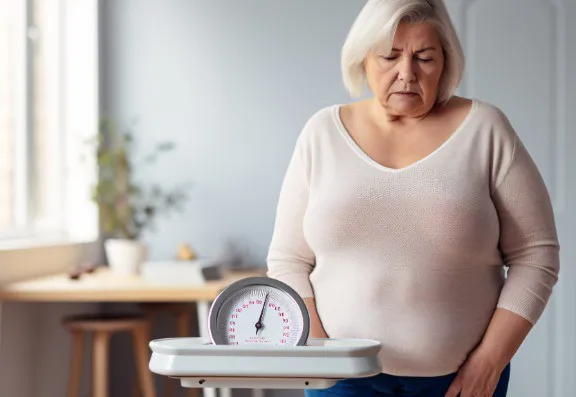Many women find that they put on weight when they are perimenopausal or menopausal. This can be upsetting, especially when it’s in addition to other challenging menopausal symptoms.
According to the NHS, women gain weight during menopause as a result of fluctuating and falling hormone levels that can affect the way we store fat. We develop insulin resistance, which makes our bodies store rather than burn calories.
Additionally, muscle mass declines with age which slows your metabolism. Without regular exercise, it’s therefore likely that you’ll put on weight.
Other menopausal symptoms such as lack of sleep, hot flashes and low mood can make it harder to exercise and eat healthily, again contributing to weight gain.

Most menopausal women find that most of their weight gain is around their stomach, rather than spread evenly across their bodies. This is often referred to as the ‘middle-age spread’. Some women find that their body shape changes and they have to go up a dress size.
Some research has indicated that stomach fat accounts for 15-20% of peri/menopausal women’s total body weight, compared to just 5-8% in pre-menopausal women.
Studies indicate that menopausal women need 200 calories less than they did previously, so eating less and adopting a more balanced diet can really help.
Aim to reduce your intake of processed foods and sugar, which are notorious for making you gain weight around your middle.
It’s also worth cutting the amount of alcohol and caffeine you drink, which can cause you to gain weight and disturb your sleep, making menopausal symptoms worse.
Increasing exercise will help you lose weight and improve your overall health. The NHS recommends:
As always, if you have any questions you can use our Menopause Q&A where you can ask for more advice.
We have lots of Menopause FAQs, Menopause videos, Menopause reviews, and Menopause before and after images for you to do more research.
If you want to look for your nearest verified Menopause clinic, your local menopause clinics are listed below.